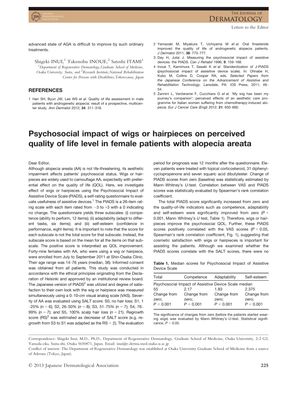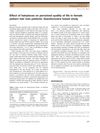Psychosocial Impact of Wigs or Hairpieces on Perceived Quality of Life in Female Patients with Alopecia Areata
December 2012
in “
The Journal of Dermatology
”

TLDR Wearing wigs or hairpieces improves self-esteem, adaptability, and competence in women with alopecia areata.
In a study conducted from July to September 2011, 49 female patients with alopecia areata (AA) aged between 14 and 76 years were evaluated to determine the psychosocial impact of wearing wigs or hairpieces on their perceived quality of life (QOL). Using the Psychosocial Impact of Assistive Device Scale (PIADS) and a visual analog scale (VAS) for satisfaction, the study found that the total PIADS score and the subscales for competence, adaptability, and self-esteem significantly improved from baseline (P < 0.001). Additionally, there was a positive correlation between the PIADS scores and the VAS scores (P < 0.05), indicating that cosmetic satisfaction with wigs or hairpieces is important for assisting patients. However, there was no significant correlation between the PIADS scores and the severity of AA or the regrowth score (RS). The mean VAS score was 7.91 ± 1.74, suggesting that patients were generally satisfied with their wigs. This study quantitatively and statistically confirmed that wigs or hairpieces can improve perceived competence, adaptability, and self-esteem in female patients with AA.





